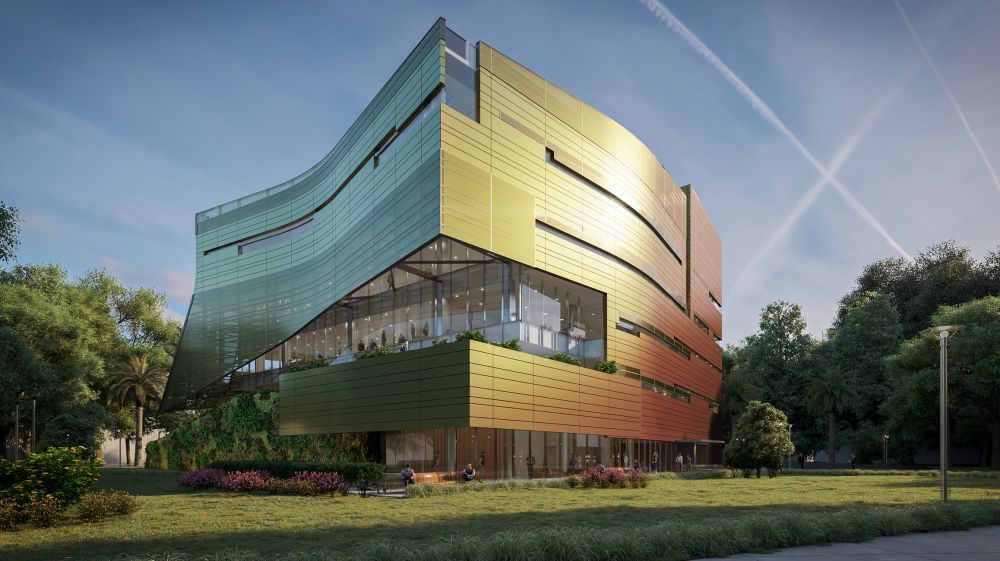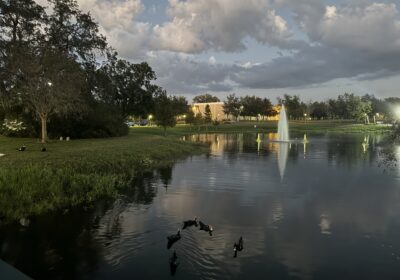USF set to break ground on new honors college building

After a year and a half of fundraising and planning, USF will officially break ground on the new Judy Genshaft Honors College building in December.
With a total cost of $54 million, the building is set to be completed in December 2022 and open to current and incoming honor students by January 2023, according to Dean of the Judy Genshaft Honors College Charles Adams. He said the college received the green light from USF administration to begin construction once there were enough funds to break ground.
“We’ve raised about $43 million right now and the fundraising effort continues,” Adams said. “We will eventually raise the entire amount, but right now we have enough that the university feels comfortable with moving ahead.”
The amount raised so far will be allocated toward building the facility’s structure while the remaining $11 million will be for the building’s interior and operations with the purchase of furniture and classroom equipment.
The college began its fundraising efforts after former USF President Judy Genshaft and her husband, Steven Greenbaum, announced a $20 million donation in 2019 to the USF Foundation to build the honors college.
While the current funds don’t cover the building’s total costs, Adams said the funds are enough to move ahead with the building’s construction.
“Nobody wants to start a building and then have to leave it incomplete,” he said. “We wanted to be able to complete the building, and so that took some time to get the funding in place that allowed the president to confirm going ahead with the construction.”
The five-story building will be located north of the Muma College of Business near Maple Drive. Beck Group, the project’s contractor, will start putting up construction screening fences around the building’s site next week.
While the construction will begin under a period of financial constraints as a result of COVID-19, Adams emphasized that the building’s construction will not be affected by USF’s recent budget cuts in state funding. He said all funds allocated to the building’s construction come exclusively from private donors and are designated for the project.
“We’re cutting, on one hand, state funding, but on the other hand, we have some philanthropy and private dollars that have been provided to move ahead with construction,” he said.
“Even in the midst of all this, I grant you it’s ironic. In the midst of all this, there is private money that enables us to go ahead but we’re not using state money for the project. It’s all philanthropy.”
As a way to bring down the total cost, Adams said some slight adjustments were made, including the purchase of less expensive finishing products like flooring and wall treatments.
“It’s still going to look great, still going to be good quality stuff, it’s just not going to be some of the more architectural material that we had originally intended to use,” he said.
Featuring study spaces, classrooms and workspaces focused on the arts, Adams said the 80,000-square-foot building will provide more space for students and faculty to interact with each other and further enhance their academic endeavors.
Currently, the honors college is housed at the John and Grace Allen Building, which consists of five classrooms. As the college’s size is expected to increase from 2,400 to 3,000 students in the next few years, Adams said the need for a bigger space is critical to maximize student success.
“We’re just limited because the Allen building is charming and historic, but rather cramped,” Adams said. “So that’s what’s going to allow us to really express ourselves fully as a college and allow our students to have the opportunities that they deserve.”
The new building will consist of 11 classrooms as well as different areas, including an open atrium and an amphitheater, to incentivize interactions and collaborations between students.
Adams said the new building will contribute to an increase in the number of students enrolled in the honors program over the upcoming years.
As space will soon no longer set a limitation for students at the honors college from further advancing their studies, Adams said the new building will set a “gold standard for honors facilities in public universities across the country.”
“That’s where we want to be. That’s what USF aspires to be — the gold standard in everything that we do,” he said. “We have a great honors college now, I believe. We’ve got lots of great students and people to support them. We just need some space for them to really realize their full potential of all the intellectual creative energy that we’ve got in the college.”






